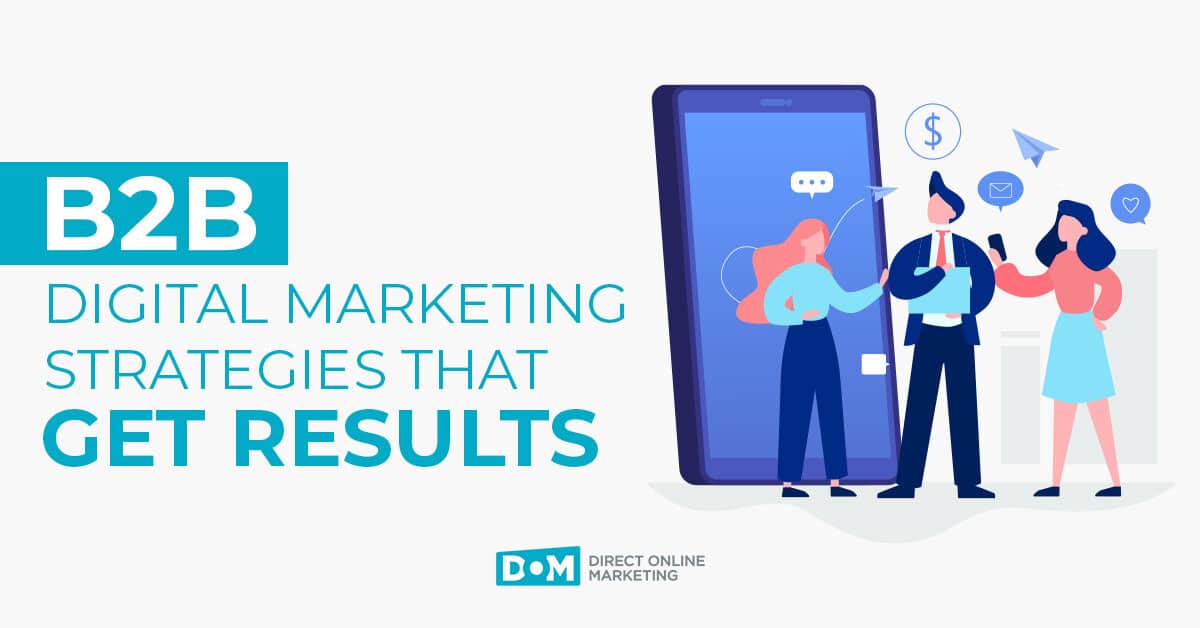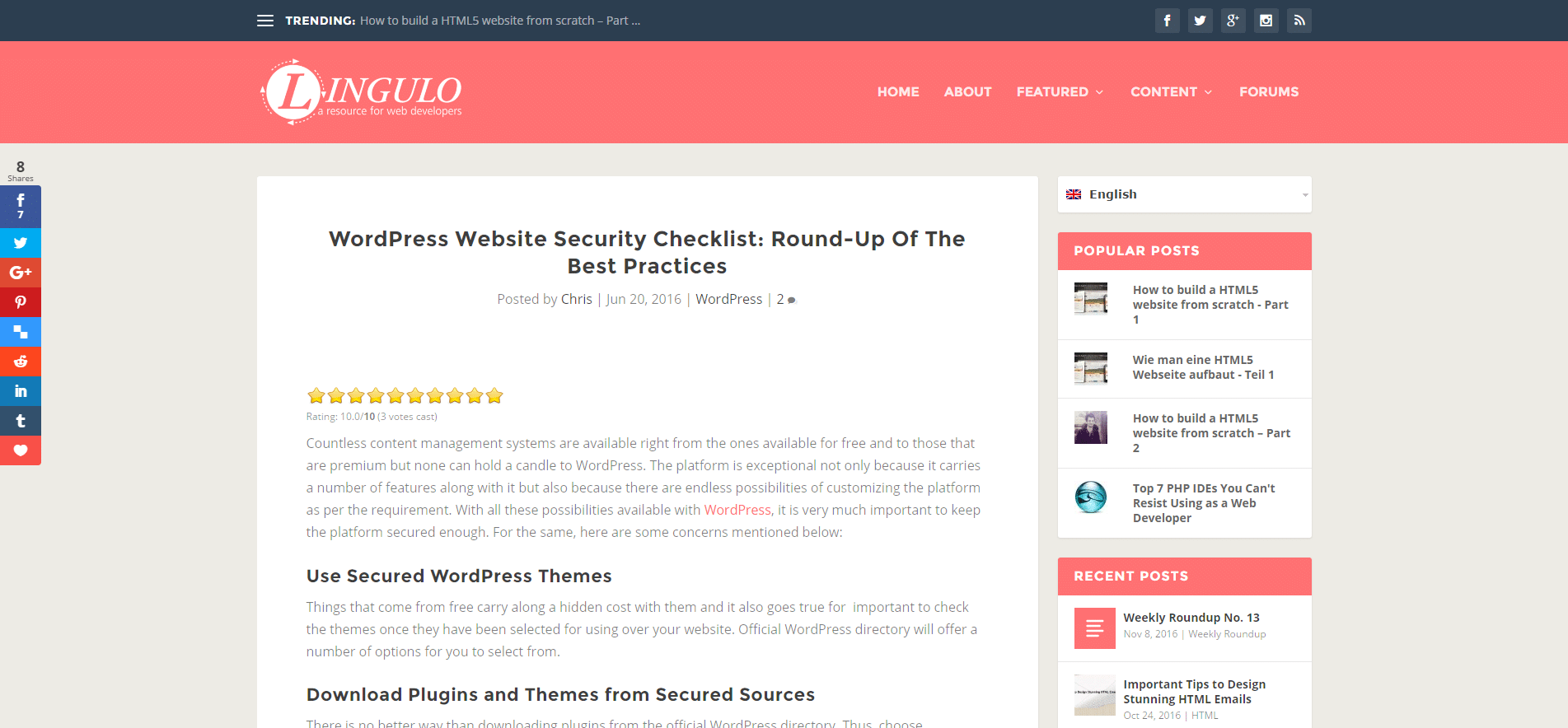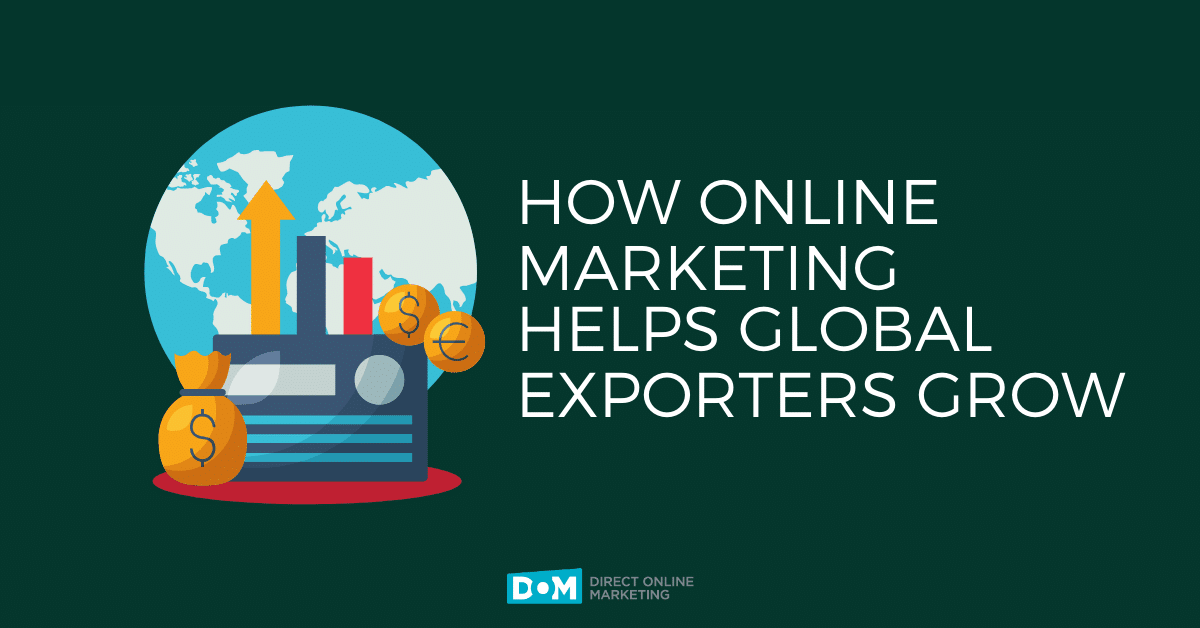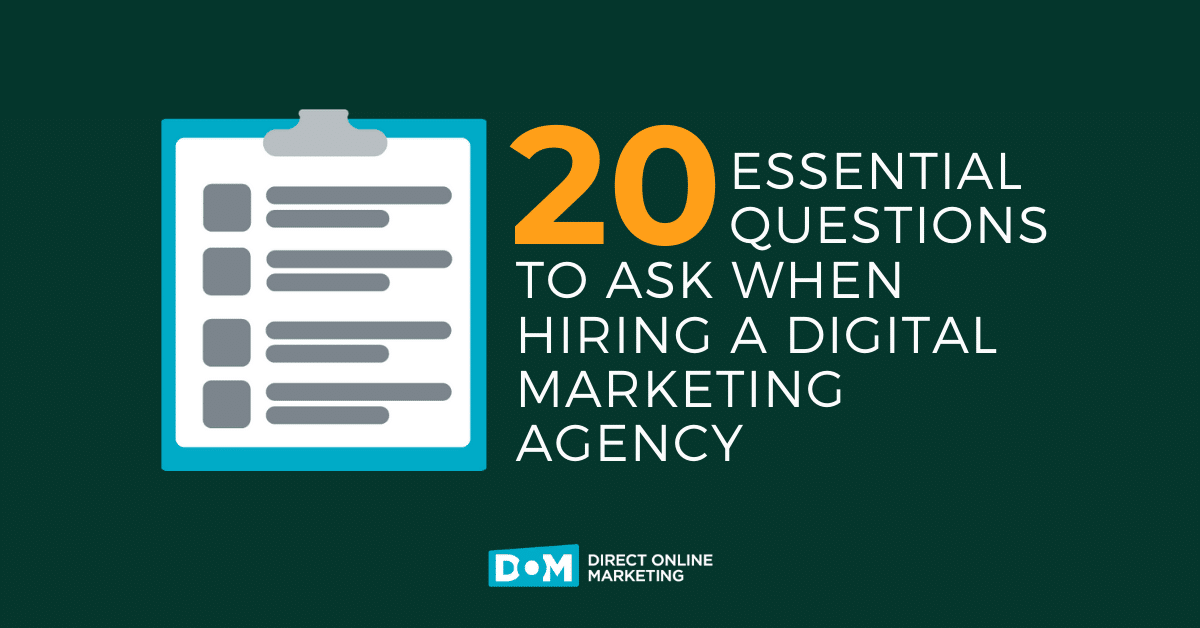
Digital Marketing Strategies For B2B Businesses
Below is a quote from the great Jack Welch that we’re almost certain you’ve never heard get applied to B2B digital marketing.
“In real life, strategy is actually very straightforward. You pick a general direction and implement like hell.”
Business-to-business marketing (B2B) and business-to-customer marketing (B2C) are two entirely different beasts requiring different approaches.
The most obvious difference, and the foundation behind the different marketing strategies, is found in the nature of whom you’re selling to.
In B2C, customers are generally looking for entertainment and products to make their lives easier. They’re looking for deals, and their desires are most often driven by impulse and emotion. They want a new blender because they want smoothies. Thus helping these customers imagine and visualize themselves enjoying the benefits of these products should be a priority focus of your marketing efforts.
B2B customers, on the other hand, are looking for something to increase ROI. They want more efficiency and productivity. They want services that bring expertise to their operations. Their purchasing decisions are made using logic and data. They require objective justification whenever possible to make their purchasing decision.
Understanding these different customer motivations is what will drive successful marketing to one audience or the other. Trying to sell your product or service to a business using the same marketing tactics that worked for B2C simply isn’t going to cut it.
Below, we’ll talk about some of the core components of successful B2B marketing, but first let’s take a deeper look into what B2B customers want.
Motivations Behind B2B Digital Marketing vs. B2C
Like we mentioned above, B2B purchases are driven by ROI potential. Businesses want products and services that will help them increase their profits. In other words, everything they buy needs to be justifiable from a business standpoint.
Furthermore, you’re usually not just selling to one decision maker in B2B.
In B2C endeavors, you’re mostly just trying to form a connection with, let’s say, Mary Spindleworth while she’s browsing for a new cute tee shirt for her dog while being slightly buzzed on merlot.
With B2B, you’re selling to the manager of a developer team at a company, and that manager will need to bring your product or service to the person who holds the company purse strings and justify why the purchase is necessary. Your marketing material had better be making that justification as clear as possible.
On that front, businesses are also looking for education about your product or service and what makes it effective. Whereas individual shoppers might check some user reviews or skim over product descriptions, businesses are looking for the whole shebang. They want features, they want benefits, and they want numbers to back it up.
That also means that selling to businesses is going to be a more involved process that involves account representatives forming a relationship with the business’s representatives. It’s not like B2C commerce where the individual is just looking to add items to their cart and check out.
Businesses want somebody to talk to, to provide support if needed and answer questions.
The better your B2B marketing material is able to speak to these needs, the more successful it’s going to be.
Now, let’s look at the B2B marketing strategies that work.
Develop Your B2B Digital Marketing Strategy!
“Strategy is not the consequence of planning, but the opposite: its starting point.” — Henry Mintzberg, management thinker and “enfant terrible” of strategic planning theory
The most important part of a B2B strategy is, well, having a strategy. Hold on, it’s more complex than it sounds.
Develop Customer Personas
B2B Digital Marketing Strategies: Personas
Before you write a single ad headline or compose even one outreach email, you need to define your customer. A great way to do this is by creating personas of your ideal buyers.
Personas are essentially fictionalized people whose lives and personalities are created by your marketing team to represent the kind of people you want to be selling to. It’s basically playing make-believe on a business level.
For instance, let’s say you’re manufacturing lightsabers. A persona for your ideal customer may look something like this:
Luke Skywalker
- COO of Jedi Temple
- Key decision-maker
- Demographics
- Age 35-75
- $90,000/yr
- Remote location, probably on top of a mountain
- Jedi Master
- Unmarried, probably no kids
- Goals and Challenges
- Create a learning environment where young padawans can flourish and learn the ways of The Force
- Protect padawans from straying to the dark side
- Attract more students to temple
- How we can help
- Supply lightsabers to be used for training purposes
- Provide ongoing support to ensure continued satisfaction
Of course the most effective personas will be created using hard data and research. That means combining user feedback and web analytics data to get a complete picture of your customers’ behavior. The more sources of data you can find to assess your ideal buyer’s motivations, attitudes, behaviors, and desired outcomes, the more successfully you can create your personas.
This guide from Hubspot is a great learning resource on personas and how to create them.
B2B Digital Marketing Strategies: SWOT
Build a SWOT Analysis
A SWOT (Strengths, Weaknesses, Opportunities, and Threats) analysis is a key component of creating your B2B strategy.
The strength and weakness components are internal things that will take some hard honest analysis to compile. These are things that are found by analyzing your team, your IPs, your location, and basically what you’re able to bring to the table.
Opportunities and threats are things that are happening outside of your company, within the larger market. What are your competitors doing? How much are materials costing right now? What are the current customer shopping trends?
Let’s break it down by category and take a look at specific questions you should be asking.
Strengths:
- What do you do well?
- What are the unique resources that you can leverage?
- What do 3rd parties see as your strengths?
Weaknesses:
- What needs improvement?
- What are competitors doing better?
- What resources are you lacking?
Opportunities:
- What are some currently present market opportunities?
- How can you leverage your strengths to take advantage of opportunities?
- What trends can you make work in your favor?
Threats:
- What is your competition doing right now?
- Do your weaknesses expose your business?
- What are the threats that can hurt your business right now?
To accurately complete a SWOT analysis, it’s best to gather representatives from each of your company’s departments. Ask questions based on the four categories and let everybody give their input. At the end of the session, rank the thoughts and ideas for importance and relevance.
Build Your Plan
After you’ve created your personas and completed your SWOT analysis, you’re ready to start creating your plan for reaching potential customers and selling them on why they should purchase your products and services.
There are frameworks out there that can help you build your plan, and there are diehard supporters of each of them.
Some of the more popular frameworks are RACE (Reach, Act, Convert, Engage), the 5 Ps, the 5Ss, and countless others with names like that. Do your research and find what works best for you.
There are also plenty of marketing agencies and consultants out there who can help with this. It’s not a bad idea to consider leveraging the expertise of others when creating your B2B marketing plan.
B2B Digital Marketing Strategies: Website Audit
How’s That Website Looking?
Your website is probably the most important tool you have for selling to B2B clients, and it should be treated as such.
That means your website should be regularly reviewed and refreshed to be as up-to-date as possible. It should have pages and information for every step of the sales funnel, from cultivating interest to driving home the sales.
Your product pages should be straight and to the point. This is what you’re selling, this is what it does, this is our proof that it’s effective.
One of our favorite examples of a great B2B website is Shopify.com. The homepage provides value within the first couple of sentences at the top. “Anyone, anywhere, can start a business,” it says. Then, right there in front of you, is a call to action to start a free trial simply by entering your email address.
Scrolling down reveals concise descriptions of the product’s features. Then there are clear-as-day numbers to provide social proof. 1,700,000+ businesses around the world using Shopify for over $200 billion in sales. Wow.
In short, a good B2B website does all of these things:
- States exactly what the product is. If your potential customers look at your site and aren’t sure what exactly it is you’re offering within the first few seconds, they’re probably going to lose interest.
- Provides immediate value. This can be a call to action for a trial or consultation. Reward potential buyers for clicking on your link.
- Uses visuals the right way. You don’t want your images to distract from your message. You want them to enhance the experience of being on your website.
- Uses concise text. The Shopify site doesn’t have a single sentence that doesn’t add value to the content. Any words that aren’t directly relevant to your product or service are adding to the work the visitor has to put in to navigate your information. If there is any text whatsoever that isn’t helping, it’s a distraction. Remove it.
These principles are important to adhere to across your homepage and any product pages. Testimonials are always good, too.
B2B Digital Marketing Strategies: SEM!
We’re often a little taken aback by how many companies there are that don’t use any PPC or SEO.
Let’s just say this off the bat: PPC and SEO are essential for reaching potential customers.
That’s right. Not just one of them. BOTH of them.
Adam Boyd, one of the principals at B2B consulting firm Northwood Group, reinforces the need for this dual approach to your B2B marketing strategy in this roundup of demand generation experts. According to Boyd:
“The real challenges for most B2B companies haven’t changed. Most are too dependent upon one channel to deliver leads, whether email, or cold calling, or PPC.”
PPC is necessary for reaching out to potential customers. We’ve already talked extensively about the powerful reach of Google Ads, so we won’t bore you with that discussion again. Needless to say, you need to run Google Ads campaigns.
While there is always a temptation to get creative with your PPC ad headlines, the reality is that it’s always better to be direct with your message.
“Lightsaber supplies for Jedi Temples” will perform better than “Need a way for your students to feel the force in their hands? Try our lightsabers!” Why? It’s more direct. People want to buy lightsabers, so tell them that you sell lightsabers.
B2B Digital Marketing Strategies: SEO For B2B
SEO will help your product pages rank higher in SERPs (Search Engine Result Pages) and make it much more likely that customers will find your name when searching for solutions.
For B2B, long tail keywords are usually better targets. For instance, if you’re selling lightsabers to Jedi temples, it’s better to optimize your content for keywords like “lightsabers for padawans” or “lightsabers in bulk” than just “lightsabers.”
Not only will the keyword difficulty be much more manageable, but it targets the intent of the search. People who are just searching for “lightsabers” are probably mostly looking for decorations for their nerd caves or LARP (Live Action Roleplaying) props. You’re looking for institutions who need to purchase a bunch of lightsabers for their students.
Revealing the Iceberg That Is B2B Digital Marketing
Those strategies are really just the tip of how involved B2B marketing can get, and it’s okay if you feel like it’s a lot to take in. Remember, there are people out there who devote their entire professional careers to learning the ins and outs of B2B digital marketing strategy.
It just so happens that we have a lot of those people working here at Direct Online Marketing.
If you or your company are looking to learn more about B2B digital marketing services, or you want to talk to somebody about creating a strategy for you from scratch, contact us today for a free consultation. And if you need more info, learn about why Direct Online Marketing is the best Digital Marketing Agency for B2B Businesses.
Marketing and marketing strategy are what we do best, and we’d love to work with you to help you find one that works.






